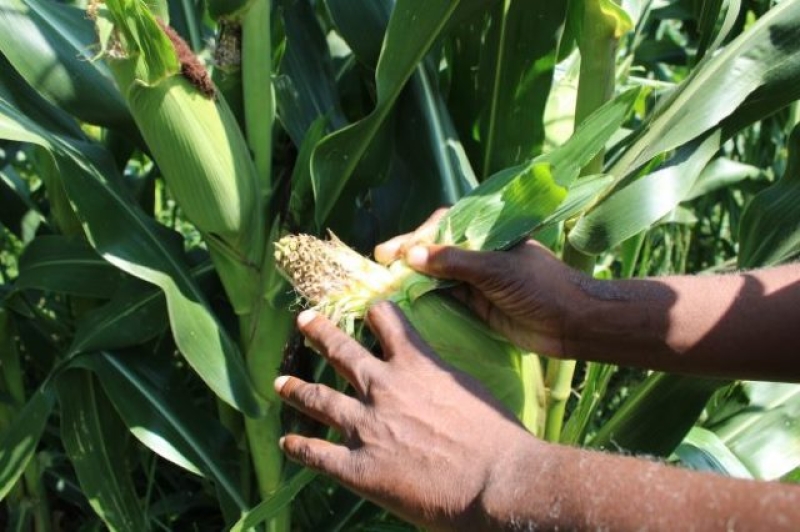- Death toll from central Israel strike rises to 5 |
- DSE sinks 138 points on broad sell-off; CSE also tumbles |
- Inside story of a roommate murder after quarrel in Dhaka |
- Jamaat condemns Khamenei’s killing, holds protest rally in Dhaka |
- Iran to pick next supreme leader in ‘one or two days’ |
World Told Act Now or Face 136 Years of Hunger, Report

The world must take action to improve food security, which is at risk due to conflict and climate change. Credit- Busani Bafana-IPS
By Busani Bafana
BULAWAYO, Zimbabwe, Oct 15 2024 (IPS) - High levels of hunger will continue for another 136 years in many developing countries, according to a new report assessing global hunger.
The report, the 2024 Global Hunger Index (GHI), paints a grim picture, predicting that global hunger levels will remain high for another century. If more progress is not made to end hunger, it will continue to reverse many development gains. The report blames the combined crises of conflict, climate change, high food prices and mounting debt, all of which are denying billions of people the right to adequate food.
Hunger Here To Stay
Published by Concern Worldwide and Welthungerhilfe, on October 10, 2024, the GHI reveals that at least 64 countries are unlikely to reach low hunger levels until 2160 if the current pace of change continues.
Hunger is at serious or alarming levels in 42 countries, with conflicts exacerbating food crises in places like Gaza and Sudan, where famine is already present in North Darfur, the report found.
Now in its 19th year, the GHI ranks countries based on recorded levels of undernourishment, child stunting, child wasting and child mortality. Of the 136 countries examined, 36 face serious hunger levels, while six at the bottom of the index—Somalia, Yemen, Chad, Madagascar, Burundi, and South Sudan—have alarming hunger levels. In 2023 alone, 281.6 million people in 59 countries and territories faced crisis-level or acute food insecurity, including Gaza, Sudan, Haiti and Burkina Faso.
The report warns that the chances of meeting the UN’s goal of zero hunger by 2030 are grim.
Concern Worldwide’s Chief Executive, David Regan, described the situation as disappointing that the 2030 goal was now out of reach.
“Our response should be to redouble our efforts to regain momentum,” Regan told IPS. “We need global action to tackle hunger.”
Sub-Saharan Africa and South Asia are the regions most affected by hunger. According to the GHI, about 22 countries in Africa are facing serious hunger levels. Of the top ten countries cited for having serious to alarming hunger levels, five are in Africa.
Conflict, Climate Change and High Debt Fuel Hunger
Large-scale armed conflicts, climate change, high food prices, market disruptions, economic downturns, and debt crises in many low- and middle-income countries have combined to complicate efforts to reduce hunger, the report found.
“Conflict can only be resolved where the external stakeholders that are typically fueling the conflict, step away from using conflict to acquire the resources or to increase the instability of the most fragile states,” Regan told IPS. “Climate change will not stop until those responsible for the largest emissions reduce them. It is not possible to say that the human right to food is being respected globally when powerful nations are clearly not playing their role in addressing its causes.”
Regan criticized wealthy nations for not playing their part in addressing global hunger, stating that while they have not turned their backs on the issue, political interest in solving hunger has waned in recent years.
The report further notes that more than 115 million people globally are internally displaced—some have been forced to migrate as a result of persecution, conflict violence and many more displaced by weather-related disasters.
The wars in Gaza and Sudan have led to exceptional food crises, the report stated, flagging rising inequality between and within countries. Although extreme poverty in middle-income countries has decreased, income inequality remains persistently high, and poverty in the poorest countries is worse than before the COVID-19 pandemic.
Gender Equality, Key to Food Security
The report also draws attention to the link between gender inequality, food insecurity, and climate change, noting that these factors combined have put communities and countries under extreme stress.
“Governments must invest in and promote gender equality and climate change and recognize and deliver on the right to food so that all people are assured the right to food,” Regan said.
Ahead of World Food Day, the United Nations Food and Agriculture Organization (FAO) has echoed the call for swift action to eliminate hunger and ensure everyone has access to safe, nutritious food.
The World Food Day is being marked under the theme Right to food for a better life and a better future, which underscores the urgency to provide varied and healthy food to all.
FAO Director General Qu Dongyu noted that 730 million people are facing hunger due to the global challenges caused by man-made and natural disasters. Besides, more than 2.8 billion people in the world cannot afford a healthy diet.
“There is no time to lose, we must take immediate action, we must act together,” Dongyu urged, reiterating that the right to food is a basic human right.
IPS UN Bureau Report

